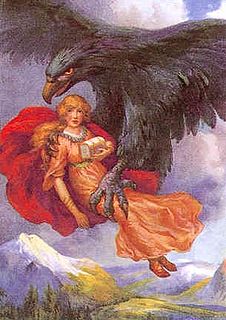Related Research Articles
Ægir, Hlér, or Gymir, is a jötunn and a personification of the sea in Norse mythology. In the Old Norse record, Ægir hosts the gods in his halls and is associated with brewing ale. Ægir is attested as married to a goddess, Rán, who also personifies the sea, and together the two produced daughters who personify waves, the Nine Daughters of Ægir and Rán, and Ægir's son is Snær, personified snow. Ægir may also be the father of the beautiful jötunn Gerðr, wife of the god Freyr, or these may be two separate figures who share the same name.
Gymir is a jötunn in Norse mythology. He is the spouse of Aurboða, and the father of the beautiful jötunn Gerðr, who married the god Freyr. Gymir may be the same figure as Ægir, a personification of the sea or ocean, or a separate figure who shares the same name.

Þrúðr, sometimes anglicized as Thrúd or Thrud, is a daughter of the major god Thor and the goddess Sif in Norse mythology. Þrúðr is also the name of one of the valkyries who serve ale to the einherjar in Valhalla. The two may or may not be the same figure.

In Norse mythology, the Nine Mothers of Heimdallr are nine sisters who gave birth to the god Heimdallr. The Nine Mothers of Heimdallr are attested in the Prose Edda, written in the 13th century by Snorri Sturluson; in the poetry of skalds; and possibly also in a poem in the Poetic Edda, a book of poetry compiled in the 13th century from earlier traditional material. Scholars have debated what being "born of nine mothers" implies and have sought to connect the notion to other European folk motifs. Scholars have theorized that Heimdallr's Nine Mothers may be identical to the Nine Daughters of Ægir and Rán, who personify waves. In turn, Heimdallr would be born of the sea.
Bestla is a jötunn in Norse mythology, and the mother of the gods Odin, Vili and Vé. She is also the sister of an unnamed man who assisted Odin, and the daughter of the jötunn Bölþorn. Odin is frequently called "Bestla's son" in both skaldic verses and the Poetic Edda.

In Norse mythology, Þjazi was a jötunn. He was a son of the jötunn Ölvaldi, brother of Iði and Gangr, and the father of Skaði. His most notable misdeed was the kidnapping of the goddess Iðunn, which is related in both the Prose Edda and the skaldic poem Haustlöng.
In Norse mythology, Þrymheimr is a home located in the giants' territory Jötunheimr. It was the residence of a jötunn, Þjazi, and was inherited by his daughter Skaði, later the wife of Njörðr.

A jötunn or, in Old English, eoten is a type of supernatural being in Germanic mythology. In Norse mythology, they are often contrasted with gods and other non-human figures, such as dwarfs and elves, although the groupings are not always mutually exclusive. The entities themselves are referred to by several other terms, including risi, þurs and troll if male and gýgr or tröllkona if female. The jötnar typically dwell across boundaries from the gods and humans in lands such as Jötunheimr.
Fárbauti is a jötunn in Norse mythology. In all sources, he is portrayed as the father of Loki. Fárbauti is attested in the Prose Edda, written in the 13th century by Snorri Sturluson, and in kennings of Viking Age skalds.
In Norse mythology, Móði and Magni[ˈmɑɣne] are the sons of Thor. Their names translate to "Wrath" and "Mighty," respectively. Rudolf Simek states that, along with Thor's daughter Þrúðr ("Strength"), they embody their father's features.
In Norse mythology, Syn is a goddess associated with defensive refusal. Syn is attested in the Prose Edda, written in the 13th century by Snorri Sturluson; and in kennings employed in skaldic poetry. Scholars have proposed theories about the implications of the goddess.
Járnsaxa is a jötunn in Norse mythology. In Snorri Sturluson's Prose Edda, she is portrayed as Thor's lover and as the mother of Magni, a three-year-old boy with prodigious force.

Gríðr is a jötunn in Norse mythology. She is the mother of Víðarr the silent and the consort of Odin. Saturn's moon Gridr was named after her.
Helblindi is a jötunn in Norse mythology. According to 13th-century poet Snorri Sturluson, he is the brother of Loki and Býleistr.
Narfi, also Nörfi, Nari or Nörr, is a jötunn in Norse mythology, and the father of Nótt, the personified night.
Aurboða is a jötunn in Norse mythology. She is married to the jötunn Gymir and is the mother of Gerðr.
Iði is a jötunn in Norse mythology. He is the son of Alvaldi and the brother of Þjazi and Gangr.
Gangr is a jötunn in Norse mythology. He is portrayed as the son of Alvaldi and the brother of Þjazi and Iði.
Helreginn is a jötunn in Norse Mythology.
Alvaldi, provisionally known as S/2004 S 35, is a natural satellite of Saturn. Its discovery was announced by Scott S. Sheppard, David C. Jewitt, and Jan Kleyna on October 8, 2019 from observations taken between December 12, 2004 and February 25, 2006. It was given its permanent designation in August 2021. On 24 August 2022, it was officially named after Alvaldi, a jötunn from Norse mythology. He was very rich in gold, and when he died his sons divided his inheritance by taking a mouthful each.
References
- ↑ Simek 1996, pp. 12, 99.
- 1 2 3 4 Orchard 1997, p. 5.
- 1 2 Simek 1996, p. 12.
- 1 2 3 Simek 1996, p. 99.
Bibliography
- Orchard, Andy (1997). Dictionary of Norse Myth and Legend. Cassell. ISBN 978-0-304-34520-5.
- Simek, Rudolf (1996). Dictionary of Northern Mythology. D.S. Brewer. ISBN 978-0-85991-513-7.